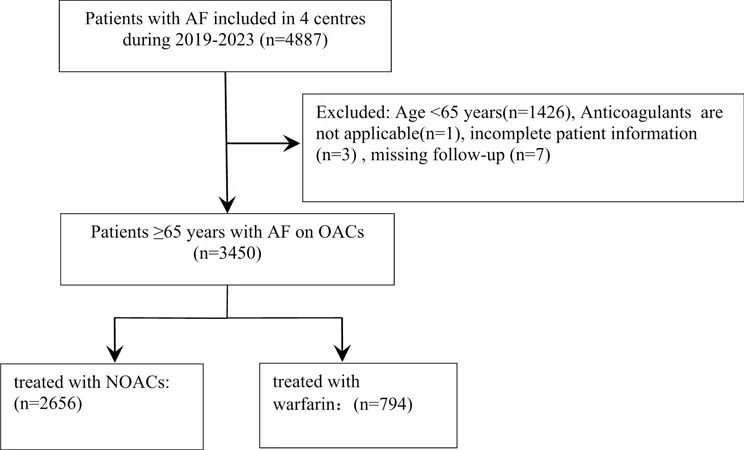
New Study Reveals Surprising Insights on Anticoagulant Use in Elderly Atrial Fibrillation Patients!
2025-03-27
Author: Noah
Introduction
As populations age worldwide, the challenge of managing atrial fibrillation (AF)—a common irregular heart rhythm—grows more complex. A recent multicenter retrospective cohort study conducted across four hospitals in China examined the efficacy, safety, and bleeding risks associated with novel oral anticoagulants (NOACs) compared to warfarin in elderly patients aged 65 and above. With stroke prevention paramount in this vulnerable demographic, the findings could redefine treatment approaches.
Study Overview
This thorough study enrolled 3,450 elderly patients with AF, tracking their outcomes over an average of 15 months. Among them, 2,656 patients were treated with at least one NOAC (including dabigatran, rivaroxaban, apixaban, or edoxaban), while 794 patients were managed with warfarin. Key clinical outcomes measured included various types of bleeding—major and minor—as well as thrombosis events and all-cause mortality.
Key Findings
The results were illuminating: patients using NOACs had a significantly lower risk of minor bleeding and all-cause mortality compared to those on warfarin. Specifically, the odds of minor bleeding dropped by 30% with NOACs, and the risk of all-cause mortality reduced by an impressive 43%. However, differences in major bleeding and thrombotic events between the two groups were not statistically significant.
Intriguingly, subgroup analyses revealed that while NOACs reduced minor bleeding risk in female patients, they were associated with a higher risk of major bleeding—demonstrating the complexity of anticoagulant management in different populations.
Understanding Atrial Fibrillation
Atrial fibrillation is not just the most prevalent arrhythmia; its incidence spikes with age. Statistics show that individuals aged 65-74 have a 2.38-fold increased risk of thromboembolism, which soars to over 8 times for those aged 85 and above. Highlighting the importance of effective anticoagulant therapies, this study emphasizes that tailoring treatment based on individual risk factors is critical in elderly populations.
The Warfarin vs NOAC Showdown
Historically, warfarin has been the go-to anticoagulant. However, as this study suggests, the emergence of NOACs has shifted the landscape. Unlike warfarin, which requires regular monitoring and dose adjustments, NOACs present a more user-friendly option—potentially improving adherence in the elderly, who might struggle with more complex regimens.
Four major randomized controlled trials established that NOACs are non-inferior to warfarin in stroke prevention. However, real-world applications often tell a different tale, as factors like comorbidities and community healthcare practices come into play.
Why This Study Matters
The results of this research not only boost the growing body of evidence in favor of NOACs for elderly patients but also illuminate the necessity of understanding patient demographics. Elderly patients, especially those in Asia, have historically been under-represented in clinical trials, which could shape treatment guidelines based on limited data.
Conclusion
This important study supports the potential of NOACs as a safer alternative for elderly patients with AF, particularly highlighting their reduced risk of minor bleeding and lower mortality rates without compromising efficacy. As healthcare practitioners seek to optimize anticoagulant therapy, this study serves as a pivotal reminder of the complexities involved in treating aging populations with multiple comorbidities.
The implications are clear: a shift towards personalized anticoagulation strategies, especially incorporating NOACs for older patients, could dramatically enhance outcomes. This research paves the way for future studies focusing on the nuanced interplay of age, gender, and comorbid conditions.
Stay Informed
To keep abreast of the latest findings in heart health and anticoagulation therapies, and to understand how these might affect you or your loved ones, be sure to follow updates in this crucial field of medicine!









 Brasil (PT)
Brasil (PT)
 Canada (EN)
Canada (EN)
 Chile (ES)
Chile (ES)
 Česko (CS)
Česko (CS)
 대한민국 (KO)
대한민국 (KO)
 España (ES)
España (ES)
 France (FR)
France (FR)
 Hong Kong (EN)
Hong Kong (EN)
 Italia (IT)
Italia (IT)
 日本 (JA)
日本 (JA)
 Magyarország (HU)
Magyarország (HU)
 Norge (NO)
Norge (NO)
 Polska (PL)
Polska (PL)
 Schweiz (DE)
Schweiz (DE)
 Singapore (EN)
Singapore (EN)
 Sverige (SV)
Sverige (SV)
 Suomi (FI)
Suomi (FI)
 Türkiye (TR)
Türkiye (TR)
 الإمارات العربية المتحدة (AR)
الإمارات العربية المتحدة (AR)